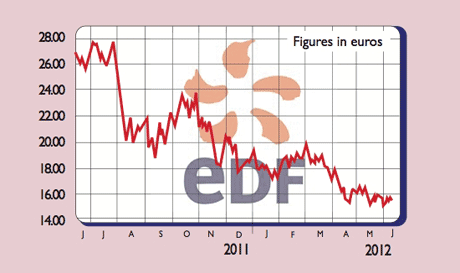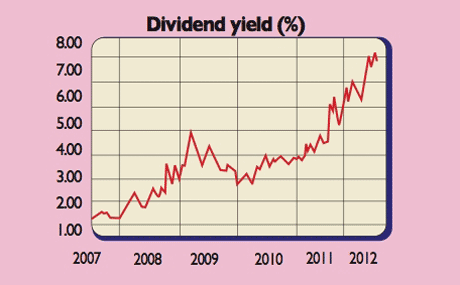Shares in focus: France’s nuclear powerhouse
With nuclear power out of favour, shares in EDF are in the bargain basement. So, should you buy the French utility? Phil Oakley investigates.
Get the latest financial news, insights and expert analysis from our award-winning MoneyWeek team, to help you understand what really matters when it comes to your finances.
You are now subscribed
Your newsletter sign-up was successful
Want to add more newsletters?

Twice daily
MoneyWeek
Get the latest financial news, insights and expert analysis from our award-winning MoneyWeek team, to help you understand what really matters when it comes to your finances.

Four times a week
Look After My Bills
Sign up to our free money-saving newsletter, filled with the latest news and expert advice to help you find the best tips and deals for managing your bills. Start saving today!
The shares of the French utility EDF are in the bargain basement it's time to buy, says Phil Oakley.
The business
lectricit de France (EDF) is one of the world's largest electricity utilities and the world's biggest generator of nuclear power. The company is 85% owned by the French government. EDF owns 134 gigawatts of power-generating assets and 1.5 million kilometres of electricity grid networks.
The bulk of the group's profits are still made in France, but it also has a large business in Britain. EDF has also invested large sums of money in Italy, eastern Europe, America and China. It serves 37 million customers worldwide and had sales of €65bn in 2011.
MoneyWeek
Subscribe to MoneyWeek today and get your first six magazine issues absolutely FREE

Sign up to Money Morning
Don't miss the latest investment and personal finances news, market analysis, plus money-saving tips with our free twice-daily newsletter
Don't miss the latest investment and personal finances news, market analysis, plus money-saving tips with our free twice-daily newsletter
The history
EDF was formed in 1946 when the French electricity and gas sectors were nationalised. The seeds of its current leading position in nuclear power generation were sown in the 1970s. At the time of the global oil crisis in 1973, nearly half of France's electricity came from oil. As a result, in 1974 France decided to build 13 nuclear plants in two years as it set about achieving energy independence. This huge increase in nuclear capacity also led to an extensive modernisation of the French electricity grid during the 1980s.
During the 1990s and early 2000s, state-owned EDF attracted widespread criticism: with European markets opening up, the company was able to hoover up foreign electricity companies, even while the French market remained protected and untouched. In 2005, a small proportion of its shares were listed on the Paris stock exchange.
The last few years have seen EDF continue to make large investments aboard buying British Energy in 2009 and Italian power company Edison in 2011. During the last year, its shares have fallen sharply. Sentiment towards nuclear power has soured following the Fukishima nuclear disaster in Japan, raising concerns about political interference in France.
The chief executive
Henri Proglio has been chief executive since 2009. Prior to joining EDF he spent more than 30 years at French environmental services company Veolia, where he became chief executive.
A prominent supporter of former president Nicolas Sarkozy and lobbyist for the French nuclear industry, there is some negative speculation in France over Proglio's job prospects, given his criticism of the new president, Franois Hollande. He was paid €1.6m in 2011.
Should you buy the shares?
EDF's share price is very depressed. Since the beginning of 2010, the firm has lost nearly two-thirds of its value due to business and political worries. The Fukushima nuclear disaster in Japan has raised concerns that it will have to spend a great deal of money to reassure consumers that its nuclear power plants are safe.
Political uncertainty has also weighed heavily on the shares. During the French presidential election campaign, Hollande talked about cutting France's reliance on nuclear power from 75% to 50% by 2025. There are also concerns that the government will not allow EDF to charge its customers more money to pay for its big investment plans.
However, we think the political threat is overblown. Cheap nuclear electricity is a key competitive advantage for a French economy looking to grow particularly at a time of austerity and the new president will realise this. Better yet, aside from all this, EDF is performing quite well. Assets have been sold and debt has been reduced. It is aiming to grow its profits by 5%-10% a year to 2015, which should mean that its high dividend yield looks safe and could even grow.
EDF is building up its gas business by investing in a liquefied natural gas terminal at Dunkirk and using its Edison investment in Italy. This should provide another source of profit growth. EDF looks cheap, and we think investors should take advantage of uncertainties to buy at these bargain levels.
The numbers

Stockmarket code: EDF
Share price: 15.78
Market cap: €29.2bn
Net assets (Dec 2011): €30.6bn
Net debt (Dec 2011): €33.3bn
P/e (current year estimate): 7.7 times
Yield (prospective): 7.7%
What the analysts say
Buy: 14
Hold: 10
Sell: 1
Average price target: €21.50
Directors' shareholdings

H Proglio: 51
T Piquemal: 0
V de Rivaz: 0
Directors have neither sold nor bought any shares in the past year.
Get the latest financial news, insights and expert analysis from our award-winning MoneyWeek team, to help you understand what really matters when it comes to your finances.
Phil spent 13 years as an investment analyst for both stockbroking and fund management companies.
-
 How a ‘great view’ from your home can boost its value by 35%
How a ‘great view’ from your home can boost its value by 35%A house that comes with a picturesque backdrop could add tens of thousands of pounds to its asking price – but how does each region compare?
-
 What is a care fees annuity and how much does it cost?
What is a care fees annuity and how much does it cost?How we will be cared for in our later years – and how much we are willing to pay for it – are conversations best had as early as possible. One option to cover the cost is a care fees annuity. We look at the pros and cons.